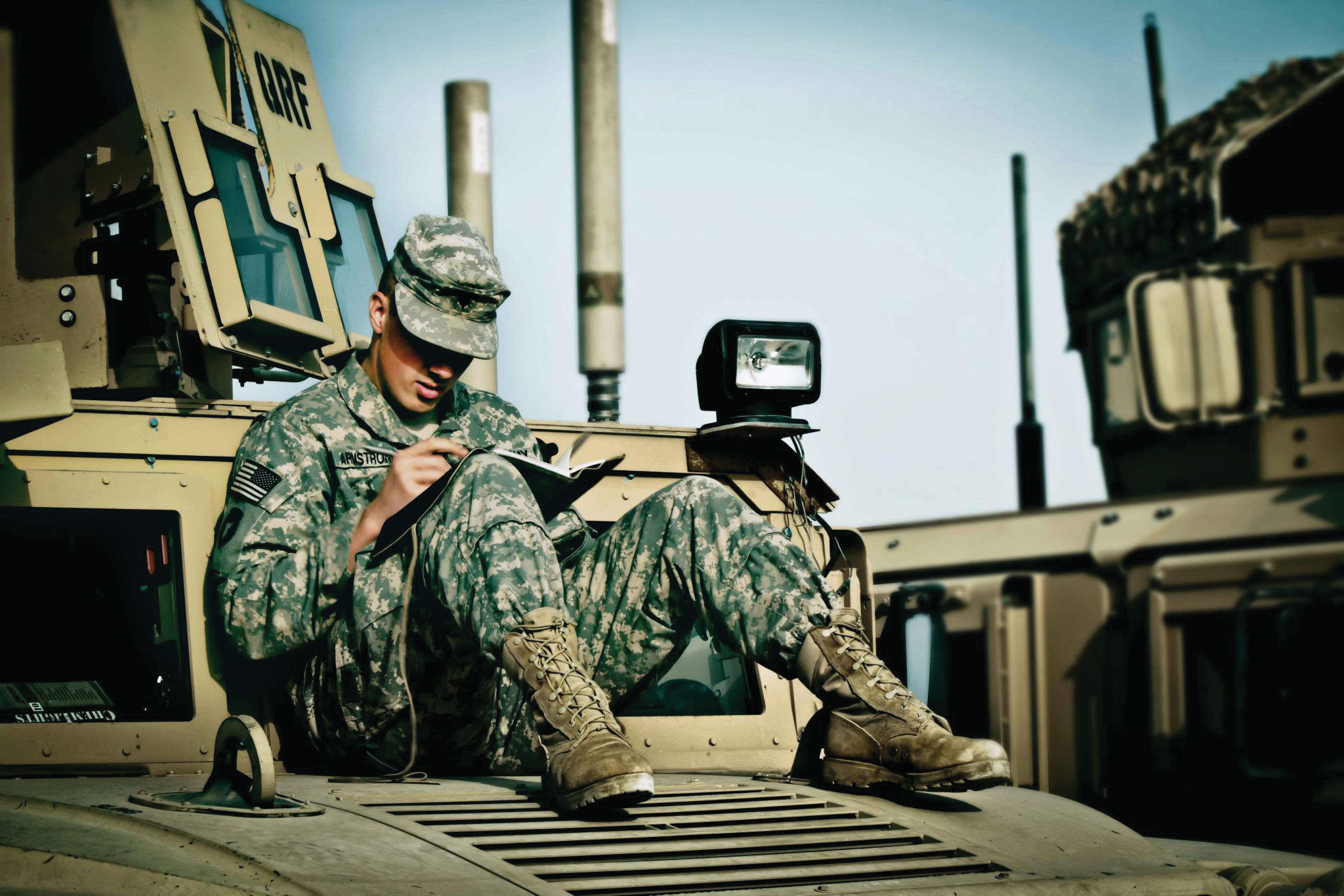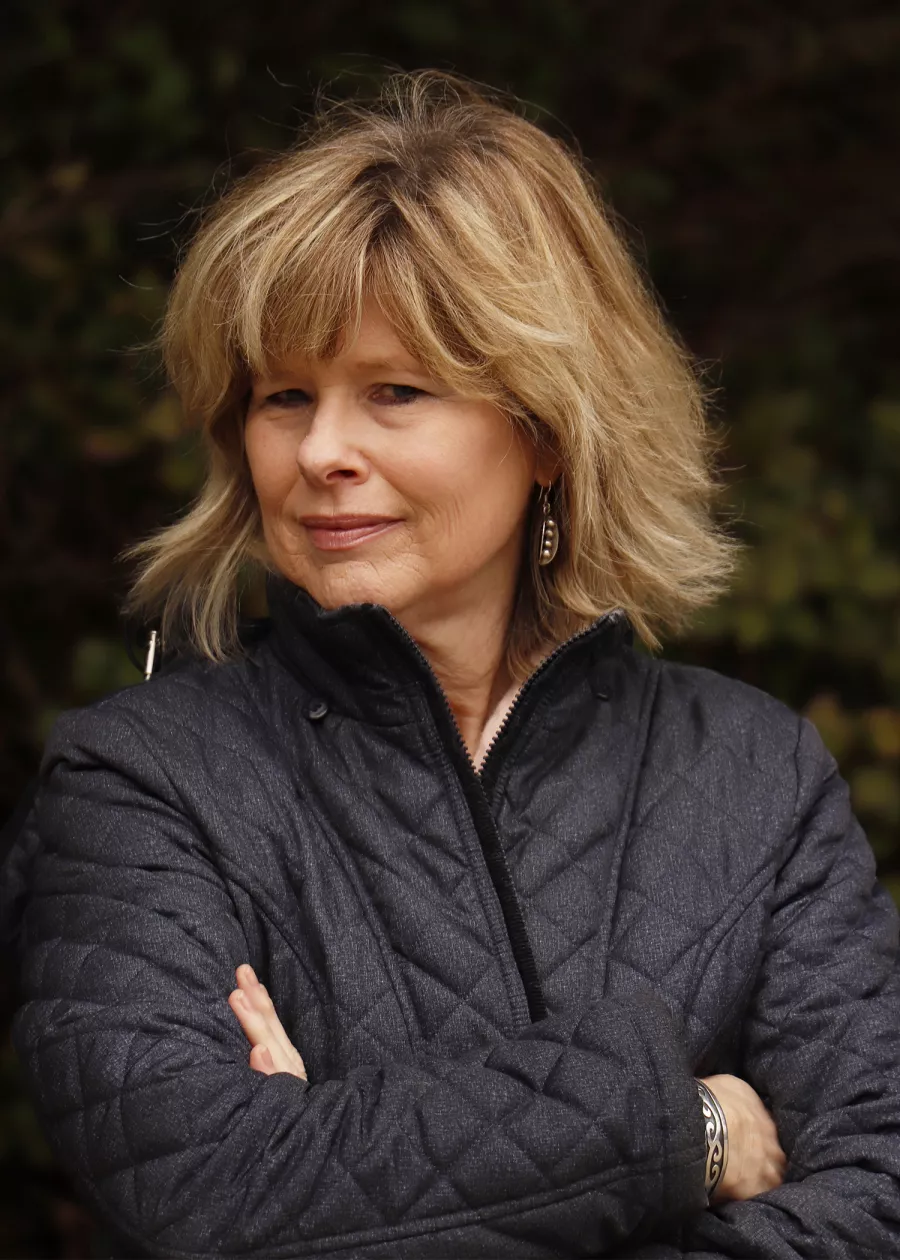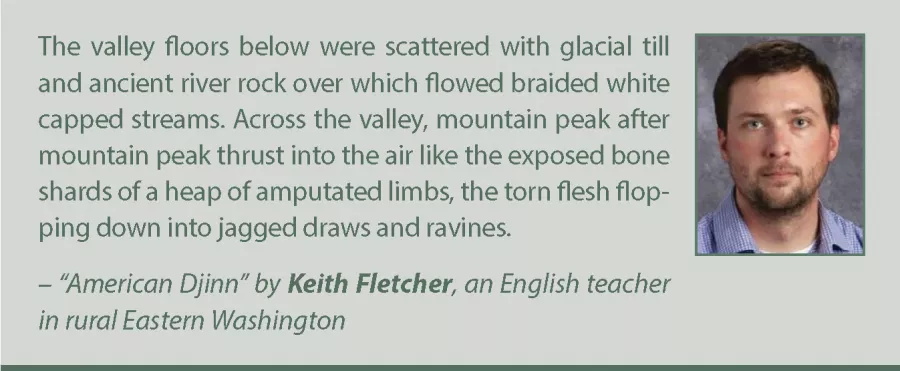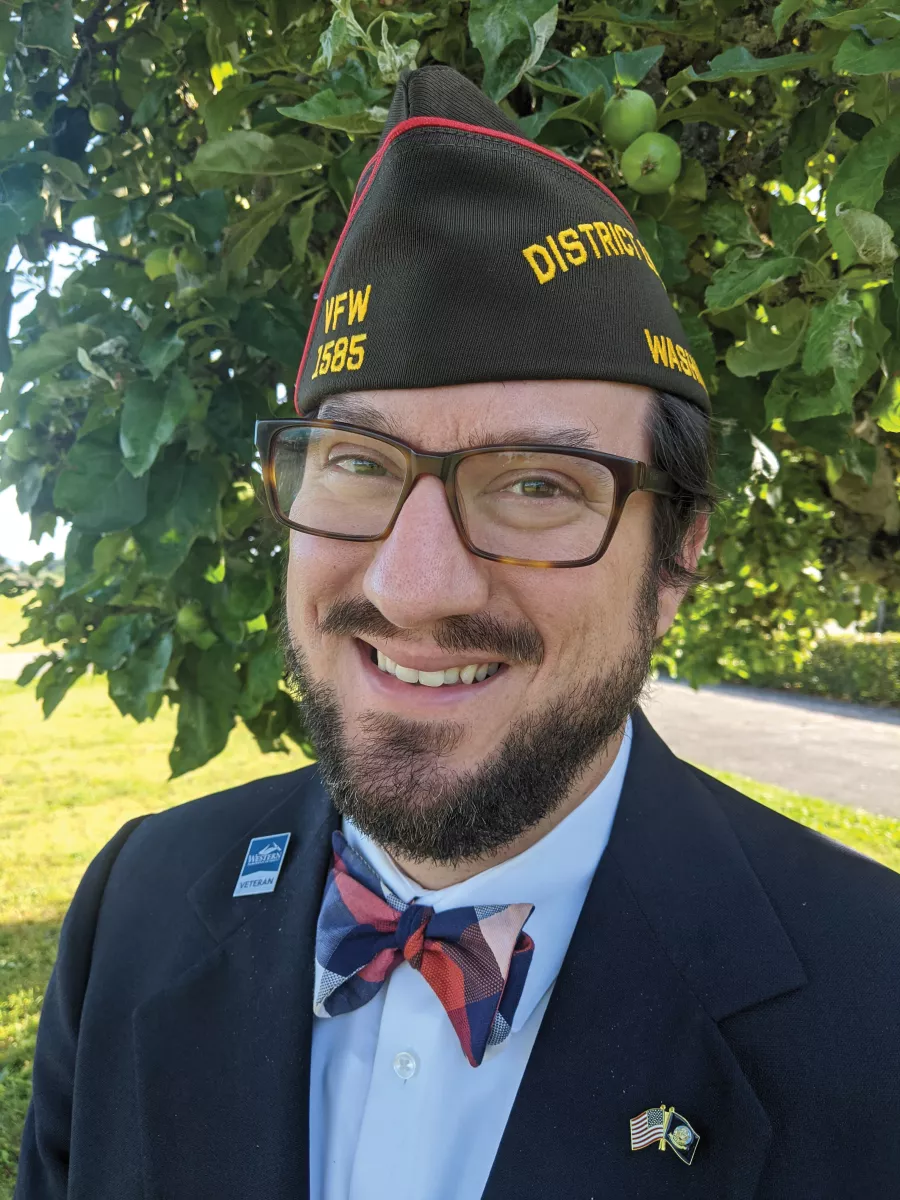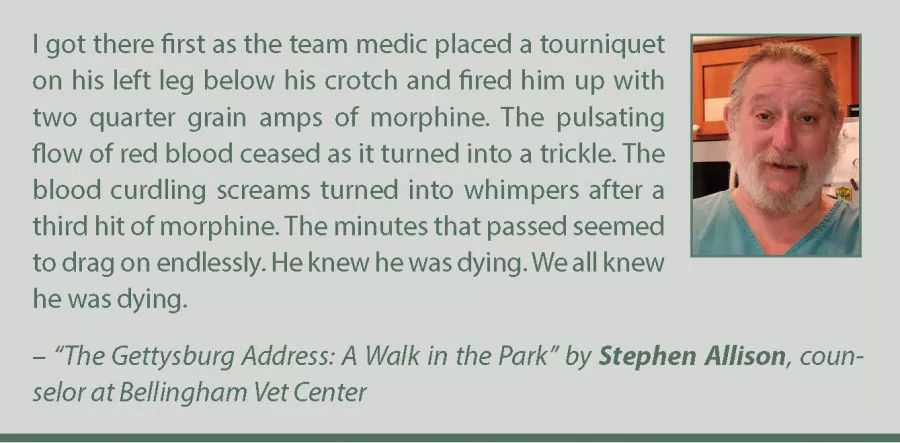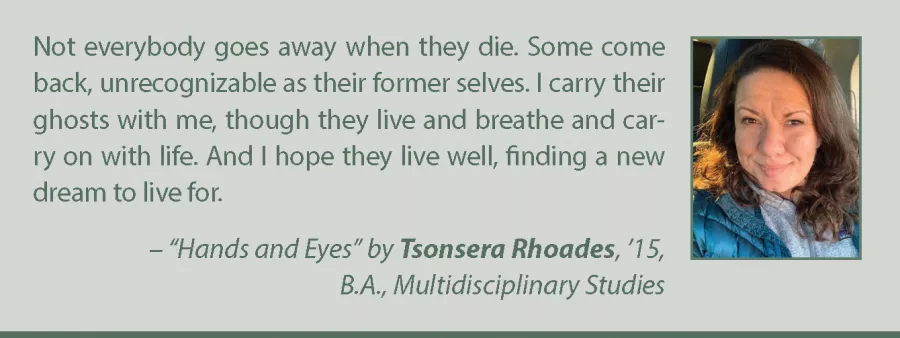There is a quote on the poster for the first “Stories Deployed: The Veteran Chronicles” in 2014—and given that Stories Deployed is a platform for veterans to tell their own stories in their own way, one might assume the words were from a noted author on the lived experience of veterans: someone like Ernie Pyle, Michael Herr, or Will Mackin.
But the quote comes from noted feminist author Dorothy Allison, and it digs down to the truth of what many vets have carried within themselves each day since their enlistment ended:
“I am the only one who can tell the story of my life and say what it means.”
This is why Stories Deployed exists: Nobody will understand the experiences of these vets unless they tell their stories, and in that telling, ease—even if just a little bit—the burden of that story’s weight.
Boot Camp
Stories Deployed began in 2013 as the brainchild of Jesse Atkins, ’14, B.S., mathematics, and ’19, M.Ed., who was running the Associated Students Veterans Outreach Center, and Kate Trueblood, a WWU professor of English.
Atkins, a native of Fresno, served as a quartermaster on the U.S.S. Alabama, a nuclear-powered ballistic missile submarine. After his enlistment he waded into civilian life as a cook in Seattle before cashing in his Montgomery G.I. Bill and coming to Western to major in applied mathematics.
While running the AS Veterans Outreach Center he began to formulate a plan to allow vets the opportunity to tell their own stories; he had found writing about his own experiences to be cathartic and reasoned that others might find it so as well.
“I was sort of mindlessly gliding through life at that time,” Atkins says. “But Western, and the outreach center, and then Stories Deployed all were things I could focus on. And knowing that the project was another way I could help the local veterans’ community was important to me.”
Soon afterward he met Trueblood, the daughter of an Army Captain who understood military culture, and she knew her skillset as an accomplished writer as well as a faculty member could help get the project off the ground.
Atkins and Trueblood decided to hold a writing workshop on campus; one student showed up. Atkins was undeterred.
“I remember asking him what to do now, and he said we needed to go to them, not expect any local vets to come onto campus. So we started the series of pizza-and-beer workshops at the local VFW and the Bellingham Veterans Center that we still do every year,” Trueblood says. “He was right. The vets were comfortable there, and participation jumped.”
Trueblood led the workshops, patiently coaxing participants to just start the process and see where it took them.
“Really, I just tried not to get in the way,” she says. “But vets, almost regardless of branch, are drilled into the concept of the ‘we,’ not the ‘I.’ It’s all about being a part of a team. Helping give voice to the ‘I’ was why I was there.”
Trueblood says one thing that strikes her every year is how vividly the vets remember their experiences and how crystalline their recollections can be, whether they’re a recently returned vet from Afghanistan or a Marine Corps medic who endured the siege of Khe Sanh in 1968.
Releasing these stories into the ether of the workshop could sometimes result in a tense and combustible evening, but it is often a crucial part of the process, she sees now.
“The reality is that no matter how intense those workshops got, those vets felt an incredible and undying loyalty towards each other. They come into the workshops with these heavy loads, these weights, and very often they find they are able to set them down because they are in an atmosphere where they have each other,” she says.
Extended Tour
With the exception of 2020 because of the pandemic, these workshops have led to a new Stories Deployed every spring since 2014, with authors including students, staff and members of the community. Very often, authors have done readings at an event on campus, but this year, with generous support from several groups on campus, the collection is being published as a written anthology.
Nick Sanchez, who served in the Marine Corps from 1998 to 2002, is the director of the Veterans Services Office on campus, a hub of veteran activity, camaraderie and events for vets at Western—and a huge proponent of Stories Deployed.
According to Sanchez, even Western vets who have an interest in creative writing may not get the opportunity to recount their stories in class—or feel comfortable doing so.
He says he knows from personal experience that vets are often prompted to tell stories, but that they rarely get the chance to say what is really on their minds.
“Most people want to hear a hero story, a war story, so we get good at giving canned answers, or funny or self-deprecating stories. The tough stories we keep to ourselves,” he says. “And they are ones that you know, deep down, only other vets will really understand.”
Language and storytelling, says Sanchez, are the tools that reveal the shades of gray not only in how the public can perceive veterans, but how vets often see themselves.
“So often, vets are looked at as either wearing devil’s horns or an angel’s halo,” he says. “The process of writing these stories helps people understand what the veterans have gone through a little more, and also helps the vet process their lived experiences in a way that helps them. It reveals those shades of gray.”
Atkins agreed.
“There’s so much more to a veteran than just their service,” he says. “But sharing their stories allows the nuances of their experiences to be seen. And it’s important to share the cost of their service because they are taken for granted by so many.”
Stateside
Atkins says Stories Deployed has helped keep him anchored to Western. As a student he couldn’t wait to get out of Bellingham. But his desire to leave town waned as his attachment grew through his work with campus and community veterans organizations. His roots deepened in 2014 when he got a job at Western after graduation and he now works as a systems administrator in Facilities Management. He also completed his master’s degree in adult education in 2019 and now serves as the Post Commander of Bellingham’s VFW Post 1585.
Throughout, he has continued to support and write for Stories Deployed. “I don’t know where we would be if Jesse hadn’t been a part of this from the beginning,” Trueblood says.
Looking over the final digital version of this year’s Stories Deployed anthology, which will be available at wwu.edu/storiesdeployed, Trueblood didn’t mince words: “These stories are direct and unflinching.”
“They are written by survivors who have been trained to move towards danger, not away from it. From holding a dying friend in your arms, to the blur of combat, to working in an ICU in a combat zone, to the loneliness of being at the bottom of the ocean … they are all here,” she says.
“Trauma has transformed these men and women. As Andrew Englund says in his story, ‘22 A Day,’ he has lost more friends to suicide after they all got home than he lost to combat with the Taliban,” Trueblood says. “At the same time, I think readers will be surprised by the humor, and the humanity, that runs through many of these pieces.”
Trueblood describes her involvement in the project, and the trust placed in her by the vets at the workshops, as a “great gift” that she doesn’t take lightly.
“When I tell non-vets about my work with Stories Deployed, I often hear back that ‘I couldn’t imagine being in combat.’ Well, they need to try,” she says. “Because failure to better understand the experience of vets pushes them away and minimizes their sacrifices. We all need to try and ponder what we would do if we were in their shoes.”
For Atkins, helping provide an opportunity for vets to ease their burdens by sharing their stories is the least he can do to help the community that has become his own.
“Many of us end up fighting the same demons,” Atkins says. “But Stories Deployed is a way to ask ourselves, ‘What is the story I want to tell about my service, and how do I want to tell it?’ ”
